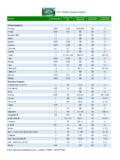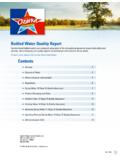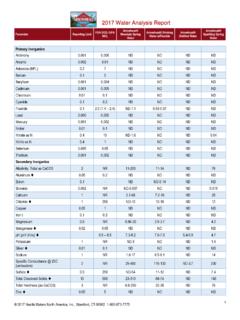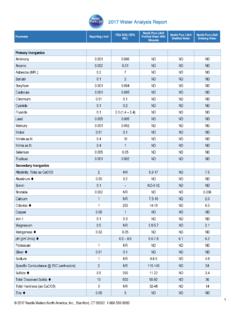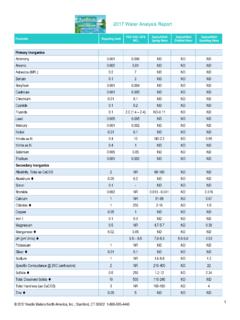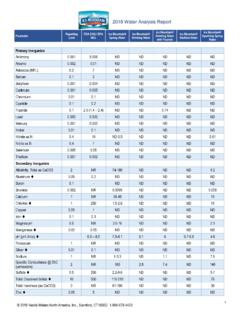Transcription of Limit EPA MCL Spring Water Distilled ... - nestle …
1 Parameter Reporting Limit FDA SOQ / EPA MCL Deer Park Spring Water Deer Park Distilled Water Deer Park Sparkling Water 1 2017 Water Analysis Report Primary Inorganics Antimony ND ND ND Arsenic ND ND ND Asbestos (MFL) 7 ND ND ND Barium 2 ND ND ND Beryllium ND ND ND Cadmium ND ND ND Chromium ND ND ND Cyanide ND ND ND Fluoride ( ) ND ND ND Lead ND ND ND Mercury ND ND ND Nickel ND ND ND Nitrate as N 10 ND Nitrite as N 1 ND ND ND Selenium ND ND ND Thallium ND ND ND Secondary Inorganics Alkalinity, Total as CaCO3 2 NR ND-100 ND ND-23 Aluminum ND ND ND Boron - ND ND ND Bromide NR ND - Calcium 1 NR ND-34 ND Chloride 1 250 ND Copper 1 ND ND ND Iron t ND ND ND Magnesium NR ND Manganese ND ND pH (pH Units) ND Potassium 1 NR ND ND Silver ND ND ND Sodium 1 NR ND-8 ND Specific Conductance @ 25C (umhos/cm) 2 NR 10-210 ND 130-200 Sulfate 250 ND-47 ND Total Dissolved Solids 10 500 10-160 ND 60-120 Total Hardness (as CaCO3)
2 3 NR ND-110 ND 32-55 Zinc 5 ND ND ND Parameter Reporting Limit FDA SOQ / EPA MCL Deer Park Spring Water Deer Park Distilled Water Deer Park Sparkling Water 2 2017 Water Analysis Report Physical Apparent Color (ACU) 3 15 ND ND ND Odor at 60 C (TON) 1 3 ND-2 1 - 2 2 Turbidity (NTU) 5 ND Microbiologicals Total Coliforms (Cfu/100 mL) Absent ND ND ND Radiologicals Gross Alpha (pCi/L) 3 15 ND ND ND Gross Beta (pCi/L) 4 ND ND ND Radium-226 + Radium-228 (sum) (pCi/L) 5 ND ND ND Uranium ND ND ND Volatile Organic Compounds 1,1,1-Trichloroethane (1,1,1-TCA) ND ND ND 1,1,2,2-Tetrachloroethane ND ND ND 1,1,2-Trichloroethane (1,1,2-TCA) ND ND ND 1,1,2-Trichlorotrifluoroethane ND ND ND 1,1-Dichloroethane (1,1-DCA) ND ND ND 1,1-Dichloroethylene ND ND ND 1,2,4-Trichlorobenzene ND ND ND 1,2-Dichlorobenzene (o-DCB) ND ND ND 1,2-Dichloroethane (1,2-DCA) ND ND ND 1,2-Dichloropropane ND ND ND 1,4-dichlorobenzene (p-DCB) ND ND ND Benzene ND ND ND Carbon tetrachloride ND ND ND Chlorobenzene (Monochlorobenzene) ND ND ND cis-1,2-Dichloroethylene ND ND ND Ethylbenzene ND ND ND Methylene Chloride (Dichloromethane) ND ND ND Methyl-tert-Butyl-ether (MTBE) ND ND ND Styrene ND ND ND Tetrachloroethylene ND ND ND Toluene 1 ND ND trans-1,2-Dichloroethylene ND ND ND trans-1,3-Dichloropropene (Telone II) ND ND ND Trichloroethene (TCE) ND ND ND Trichlorofluoromethane (Freon 11)
3 ND ND ND Parameter Reporting Limit FDA SOQ / EPA MCL Deer Park Spring Water Deer Park Distilled Water Deer Park Sparkling Water 3 2017 Water Analysis Report Vinyl chloride (VC) ND ND ND Xylene (Total) 10 ND ND ND Chlorinated Acid Herbicides 2,4,5-TP (Silvex) ND ND ND 2,4-Dichlorophenoxyacetic acid(2,4-D) ND ND ND Bentazon ND ND ND Dalapon ND ND ND Dinoseb ND ND ND Pentachlorophenol ND ND ND Picloram ND ND ND Chlorinated Pesticides Alachlor ND ND ND Chlordane ND ND ND Endrin ND ND ND Heptachlor ND ND ND Heptachlor epoxide ND ND ND Lindane ND ND ND Methoxychlor ND ND ND Polychlorinated biphenyls (PCBs) ND ND ND Toxaphene ND ND ND Miscellaneous Herbicides 2,3,7,8-TCDD (DIOXIN) (ng/L) x - ND ND ND Diquat ND ND ND Endothall ND ND ND Glyphosate ND ND ND Semi-Volatile Organic Compounds (Acid/Base/Neutral extractables) Atrazine ND ND ND Benzo(a)pyrene ND ND ND bis(2-Ethylhexyl)phthalate ND ND ND Di(2-ethylhexyl)adipate ND ND ND Hexachlorobenzene ND ND ND Hexachlorocyclopentadiene ND ND ND Molinate ND ND ND Simazine ND ND ND Thiobencarb ND ND ND Parameter Reporting Limit FDA SOQ / EPA MCL Deer Park Spring Water Deer Park Distilled Water Deer Park Sparkling Water 4 2017 Water Analysis Report Carbamates (Pesticides)
4 Aldicarb ND ND ND Aldicarb sulfone ND ND ND Aldicarb sulfoxide ND ND ND Carbofuran ND ND ND Oxamyl ND ND ND Microextractables 1,2-Dibromo-3-chloropropane ND ND ND 1,2-Dibromoethane (EDB) 5e-005 ND ND ND Disinfection Byproducts Bromate ND ND Chlorite 1 ND ND ND D/DBP Haloacetic Acids (HAA5) ND ND ND Total Trihalomethanes (Calc.) ND ND ND Residual Disinfectants Chloramines 4 ND ND ND Chlorine Dioxide ND ND ND Chlorine Residual, Total 4 ND ND ND Other Contaminants Perchlorate ND ND ND All units in (mg/l) or Parts per Million (PPM) unless otherwise indicated. EPA Secondary Standard - non-enforceable guidelines regulating contaminants that may cause cosmetic or aesthetic effects in drinking Water Set by California Dept.
5 Of Health Services MRL - Minimum Reporting Limit . Where available, MRLs reflect the Method Detection Limits (MDLs) set by the Environmental Protection Agency or the Detection Limits for Purposes of Reporting (DLRs) set by the California Department of Health Services. These values are set by the agencies to reflect the minimum concentration of each substance that can be reliably quantified by applicable testing methods, and are also the minimum reporting thresholds applicable to the Consumer Confidence Reports produced by tap Water suppliers. EPA MCL - Maximum Contaminant Level. The highest level of a substance allowed by law in drinking Water (bottled or tap Water ). The MCLs shown are the federal MCLs set by the Environmental Protection Agency and the Food and Drug Administration, unless no federal MCL exists.
6 Where no federal MCL exists, the MCLs shown are the California MCLs set by the California Department of Health Services. California MCLs are identified with an ( ). FDA SOQ - Standard of Quality. The standard of quality for bottled Water is the highest level of a contaminant that is allowed in a container of bottled Water , as established by the United States Food and Drug Administration (FDA) and the California Department of Public Health. The standards can be no less protective of public health than the standards for public drinking Water , established by the Environmental Protection Agency (EPA) or the California Department of Public Health. Reported Results - The highest level of each substance detected at or above the MRL in representative finished product samples. ND - Not detected at or above the MRL.
7 NR - Not listed in State or Federal drinking Water regulations. NA - Not applicable to specific test method or test parameter PPB - Parts per Billion. Equivalent to micrograms per liter ( g/l). MFL - Million Fibers per Liter. 5 2017 Water Analysis Report Deer Park Natural Spring Water sources; Primary: Frontier Spring located in New Tripoli, PA; Bangor, PA; Stroudsburg, PA; Hegins, PA; South Coventry, PA; Pine Grove, PA; Newmanstown, PA; Oakland, MD; Spring of Life, Lake County, FL; White Springs, Liberty County, FL; Madison Blue Spring , Madison County, FL; Glenwood Spring , St. Albans, ME; Swift Springs, Chesterfield County, SC and/or Sweetwater Falls, Hohenwald, TN. Distilled Water sources: Primary: Public Water Supply or On-Site Well. Factory Water Treatment Process for Deer Park Natural Spring Water , Distilled Water and Sparkling Spring Water The final treatment consists of the following processes: Spring Water Distilled Water Sparkling Spring Water 1.
8 Storage Silo holding filtered source Water 2. Microfiltration 3. Ultraviolet and/ or Ozone disinfection 4. Bottling 1. Storage Silo holding filtered source Water 2. Distillation 3. Microfiltration 4. Ultraviolet and/or Ozone disinfection 5. Bottling 1. Storage Silo holding filtered source Water 2. Microfiltration 3. Ultraviolet and/ or Ozone disinfection 4. CO2 injection 5. Bottling Statements Required Under California Law Drinking Water , including bottled Water , may reasonably be expected to contain at least small amounts of some contaminants. The presence of contaminants does not necessarily indicate that Water poses a health risk. More information about contaminants and potential health effects can be obtained by calling the United States Food and Drug Administration, Food and Cosmetic Hotline (1-888-723-3366).
9 Some persons may be more vulnerable to contaminants in drinking Water than the general population. Immunocompromised persons, including, but not limited to, persons with cancer who are undergoing chemotherapy, persons who have undergone organ transplants, persons with HIV/AIDS or other immune system disorders, some elderly persons, and infants can be particularly at risk from infections. These persons should seek advice about drinking Water from their health care providers. The United States Environmental Protection Agency and the Centers for Disease Control and Prevention guidelines on appropriate means to lessen the risk of infection by cryptosporidium and other microbial contaminants are available from the Safe Drinking Water Hotline (1-800-426-4791). The sources of bottled Water include rivers, lakes, streams, ponds, reservoirs, springs, and wells.
10 As Water naturally travels over the surface of the land or through the ground, it can pick up naturally occurring substances as well as substances that are present due to animal and human activity. Substances that may be present in the source Water include any of the following: 1. Inorganic substances, including, but not limited to, salts and metals, that can be naturally occurring or result from farming, urban storm Water runoff, industrial or domestic wastewater discharges, or oil and gas production. 2. Pesticides and herbicides that may come from a variety of sources, including, but not limited to, agriculture, urban storm Water runoff, and residential uses. 3. Organic substances that are byproducts of industrial processes and petroleum production and can also come from gas stations, urban storm Water runoff, agricultural application, and septic systems.
